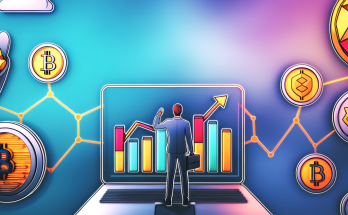The future of work is rapidly evolving, with economics playing a pivotal role in shaping career landscapes. According to the World Economic Forum’s Future of Jobs Report 2023, 69 million new jobs are expected to emerge by 2027, many in the field of economics and related disciplines.
The Changing Face of Economic Careers
As global markets become increasingly interconnected, the demand for skilled economists continues to rise. Traditional roles are being transformed by technological advancements, creating new opportunities for those with a keen understanding of economic principles and data analysis.
The integration of artificial intelligence and machine learning into economic forecasting has revolutionized the field, requiring professionals to adapt and acquire new skills. This shift has led to the emergence of hybrid roles that combine economic expertise with technological proficiency.
1. Data Economist
In the age of big data, the role of a Data Economist has become increasingly crucial. These professionals bridge the gap between raw data and economic insights, using advanced analytical tools to interpret complex datasets.
Key responsibilities include:
– Developing predictive models for market trends
- Analyzing consumer behavior patterns
- Providing data-driven recommendations for business strategiesThe U.S. Bureau of Labor Statistics projects a 13% growth in data-related jobs from 2020 to 2030, faster than the average for all occupations source
2. Behavioral Economist
Behavioral Economics has gained significant traction in recent years, blending psychology with economic theory to understand decision-making processes. Behavioral Economists are in high demand across various sectors, including:
– Government policy development
- Corporate strategy formulation
- Financial services and investment firmsTheir work involves designing experiments, analyzing human behavior in economic contexts, and developing interventions to nudge individuals towards better financial decisions.
A study by the Harvard Business Review highlights that companies employing behavioral economists have seen up to a 20% increase in the effectiveness of their marketing strategies source.
3. Environmental Economist
With growing concerns about climate change and sustainability, Environmental Economists are at the forefront of developing economic solutions to environmental challenges. Their expertise is crucial in:
– Assessing the economic impact of environmental policies
- Developing carbon pricing mechanisms
- Advising on sustainable resource managementThe International Labour Organization predicts that the transition to a green economy could create 24 million new jobs globally by 2030 source.
4. AI Economics Specialist
As artificial intelligence continues to reshape industries, AI Economics Specialists are becoming indispensable. These professionals focus on:
– Analyzing the economic implications of AI adoption
- Developing AI-driven economic models
- Addressing ethical considerations in AI-powered economic systemsThe World Economic Forum reports that AI could contribute up to $15.7 trillion to the global economy by 2030, highlighting the immense potential for careers in this field.
5. Gig Economy Analyst
The rise of the gig economy has created a need for experts who can navigate its complexities. Gig Economy Analysts specialize in:
– Studying labor market trends in the freelance and contract work sectors
- Developing policies to protect gig workers’ rights
- Analyzing the impact of the gig economy on traditional employment modelsAccording to a report by Mastercard, the global gig economy is expected to grow to $455 billion by 2023, underscoring the importance of this emerging career path.
Skills for Success in Future Economic Careers
To thrive in these promising careers, economists of the future must cultivate a diverse skill set:
1. Advanced data analysis and programming skills (R, Python, SQL)
- Strong understanding of machine learning and AI applications in economics
- Excellent communication skills to translate complex economic concepts
- Adaptability to rapidly changing technological landscapes
- Interdisciplinary knowledge spanning economics, psychology, and environmental science
Education and Training Pathways
Preparing for these future-oriented careers often requires a combination of formal education and practical experience:
– Advanced degrees in Economics, Data Science, or related fields
- Specialized certifications in AI, behavioral economics, or environmental policy
- Internships or research positions in cutting-edge economic institutions
- Continuous learning through online courses and professional development programsMany universities are now offering tailored programs that combine economics with data science or behavioral studies to meet the evolving demands of the job market source.
Challenges and Opportunities
While these careers offer exciting prospects, they also come with challenges:
– Rapid technological changes requiring constant skill updates
- Ethical considerations in data usage and AI applications
- Balancing economic growth with environmental sustainability
- Navigating complex global economic systemsHowever, these challenges present opportunities for innovative thinkers to make significant contributions to the field of economics and shape the future of work.
The Future is Now: Preparing for Tomorrow’s Economic Landscape
As we look towards the future of economic careers, it’s clear that adaptability, technological proficiency, and interdisciplinary knowledge will be key to success. The five careers highlighted – Data Economist, Behavioral Economist, Environmental Economist, AI Economics Specialist, and Gig Economy Analyst – represent just a fraction of the exciting opportunities emerging in the field.
To stay ahead in this dynamic landscape, aspiring economists should:
– Continuously update their skills and knowledge
- Seek out internships or projects in emerging economic fields
- Network with professionals in innovative economic sectors
- Stay informed about global economic trends and technological advancementsThe future of economics is bright, diverse, and full of potential for those willing to embrace change and push the boundaries of traditional economic thinking.
Are you excited about these future career prospects in economics? Share your thoughts on which career path intrigues you most or what skills you think will be crucial for economists of the future. Join the conversation and help shape the economic landscape of tomorrow!


